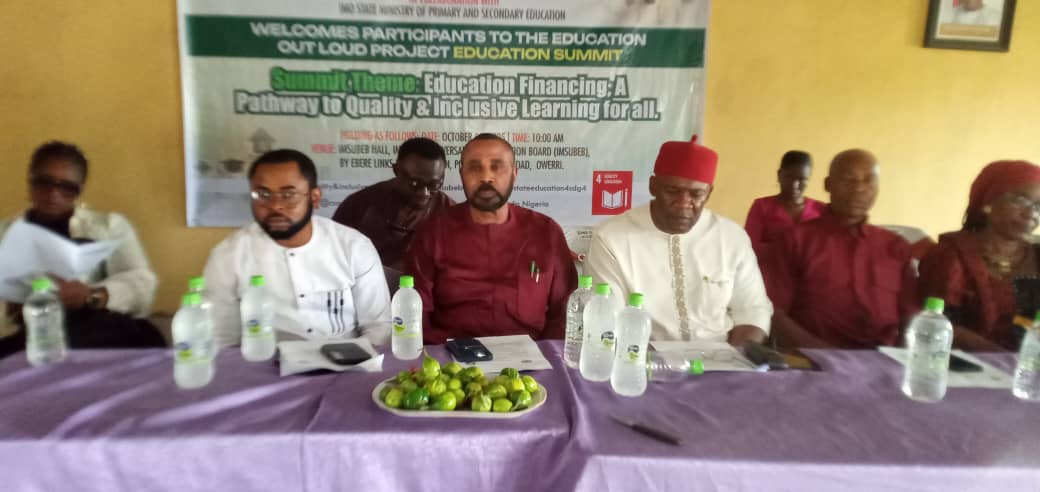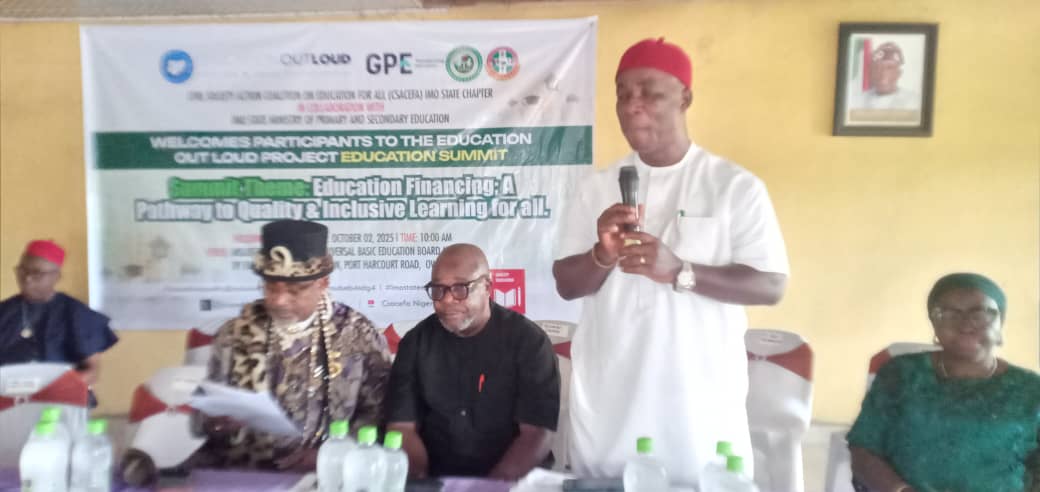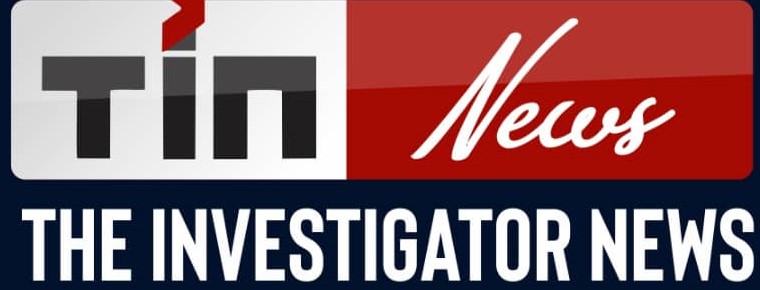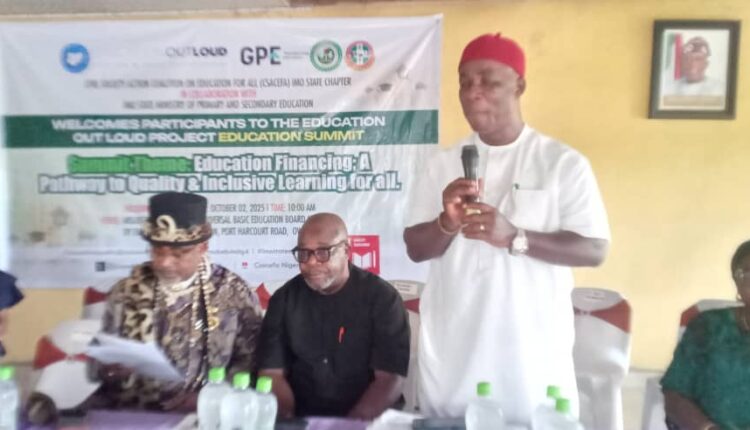CSACEFA, Stakeholders’ Advocacy Enhance Education Funding In Imo
By Chigozie Uzosike, Owerri
The funding allocation of education sector in Imo State has increased from 2024 to 2025 given the advocacies and engagements of the civil society organizations coordinated by Civil Society Action Coalition on Education for All (CSACEFA).
In his analysis of the state budget at the education summit held on Thursday October, 2025 in collaboration with the Ministry of Primary & Secondary Education, the State Coordinator of CSACEFA, Elder Kenneth Amogu said there’s an improvement of what is budgeted for 2025 against 2024 and 2023. “While the total state budget in 2025 is N807B the budget for Education sector is N67B With this amount, Education got 8.30%-of the total state budget, which is about 99.84% increase compared to the 2024 budgetary allocation of 4.23%”. CSACEFA Imo State appreciates all the stakeholders for this efforts.
“In 2024, the total State budget stood at N592B with the budget for the Education sector standing at N25B With this amount, Education got 4.23% of the total state budget. The total state budget in 2023 stood at N474B, Education got a sector budget of
N23B and With this amount, Education got 4.98% of the total state budget”.
Amogu said, “The Education sector got more funds in 2025 (2025 budget N67B Less N25B-2024 Budget = N41B), With extra = N41B in 2025, the Education sector received a significant increase in funding. With this development, the state has made progress towards achieving the internationally recommended benchmark of 20% of Public Expenditure allocated to Education”.

Speaking during the Education Out Loud (EOL) project, Education Summit organized by Civil Society Action Coalition on Education For All (CSACEFA) in collaboration with the Ministry of Primary and Secondary Education, at IMSUBEB Multi purpose hall, the Commissioner for Primary and Secondary Education, Prof. Bernard Ikegwuoha said there’s need to understand that the community members ought to take ownership of the schools in their communities and stop blaming government because government cannot do it alone. He hinted that the state government under Distinguished Senator Hope Uzodimma is bringing innovation that would help boost education and reduce financial racketeering in the education sector. “Going forward payment of WAEC will be paid through a portal. The 408 secondary and 1277 primary schools respectively will go through a cashless process that will help ease the pains parents suffer”.
He called on individuals, stakeholders to contribute their quota to the development of education. He called on communities to mobilize efforts in rebuilding their dilapidated schools and protecting them, stressing that alumni associations should come in and support their alma-mata. He urged corporate institutions to deploy their Corporate Social Responsibility (CSR) funds to developing education in the state. He urged stakeholders to think globally and act locally in addressing the concerns of education funding”.

In his contributions, the Commissioner for Tertiary and Technical Education, Imo state, Prof. Victor Nwachukwu said, “Education is not seen in the flamboyancy of life. The real education is about the continuous refinement of the sensibility of man”.
He insisted that to ensure proper funding of education, public-private partnership has to play key factor because private investors who are lovers of education and philanthropists need to come in to close the gap between what is budgeted and what is released especially that the government of Imo state has shown commitment to providing better learning environment for education to thrive. He talked about crowd funding and revenue diversification in increasing education funding.
In his submission, the Executive Chairman of IMSUBEB, Hon. Chidiebere Egbo called on stakeholders to continue to support the state government in her resolve to delivering better equiped classrooms, especially now that the SMART school development is under way to enable students go global and digitalized. He said that Education for All is the responsibility of all, not the government alone.
In his submission, the traditional ruler of Umuokanne community, HRH, Eze, Dr. Mathew Chiedozie Nwokoma (Okaa Omee IV of Umuokanne) called on the rich in the communities to pick one child in their communities and train them to university level, that way according to him, the rate of out-of- school children will reduce. He said this approach will support the government in her free education programme.
In his opening speech earlier, the CSACEFA Coordinator, Imo State chapter, Elder Kenneth Amogu appreciated CSACEFA National Secretariat, supported by GPE Oxfam denmark for considering Imo State worthy to be part of the Education Out Loud Project OC 1.3. He noted that the Education Out Loud (EOL) Project Education Summit is coming at a time every education stakeholder in the State needs to redouble their efforts in ensuring that the SDG 4 is achieved, adding that education in the State is yet to become transformative which aims to eradicate poverty. He appreciated the Ministry of Primary and Secondary Education, and the Imo State Universal Basic Education Board (IMSUBEB) through the UNICEF and other NGO Desk, for their support and collaboration to host the summit again. He lauded stakeholders for making out time to attend.
“Being the second Education Summit, within the implementation time line of the EOL Project OC 1.3 (2024-2026), the Summit is coming at a time stakeholder needs to look at efforts made so far in ensuring that the SDG 4 is achieved in the state. With 5 more years remaining to get to 2030, we have recorded a number of progress, still our education system needs more funding to achieve the goal. The objective of this summit is to bring education stakeholders in the state together to note the level of progress made in the sector, identify areas that require further funding support, make recommendations, and with our context in view, make suggestions on how to work together for better financing of the sector to enable the state achieve SDG 4”.
“While we appreciate government on the progress made so far, which include the commencement of documentation and training of the recruited teachers, monitoring on the use of approved school curriculum, the reconstitution of SBMC, etc, we will want you to note that participants at today’s summit are drawn from key stakeholders with wealth of knowledge and information about the sector, and will bring this information to the table as we deliberate on how to improve the financing support of the education sector in the state to do more. While we welcome inputs from our participants, we will like to remind all that partnership and collaboration is very essential in achieving targeted goals, and eradicating poverty. As we deliberate today, let us stop the impediments to education financing progress and be willing to change them for the state to make the required progress”.
The Director UNICEF and other NGO Desk of IMSUBEB, Dr. Mrs. Chinwe Adim-Madumere encouraged participants to contribute positively to the development of education at their Individual levels, while appreciating all and sundry for coming.

One of the highlights of the summit was Imo CSACEFA presentation of an analysis of the 2025 State Budget, relating it to the Education sector budget of 2024 and 2023, and CSACEFA recommendations and position on critical needs of the Education sector, which include increase of sector funding to address some critical needs, like: improvement on teachers professional development and training, with provision of mordern trainings like the Gender Responsive Pedagogy Teachers Training -GRPTT, Teachers welfare, maintenance of a Gender Responsive Education Sector Plan, Development of sector Central Data Base, improvement of school security and infrastructure with support of the School Based Management Committee (SBMC), Release of Budgeted funds for the sector projects implementation,improvements on school infrastructure, partnerships for the adoption of schools, among others.
In a communique issued at the end of the Summit, participants agreed on the need for corporate organisations to support the education sector as part of their CSR, for individuals and Philanthropists to adopt a child for scholarship, adopt a school for support, for diaspora unions to give back to their alma mater, for communities to secure and protect school infrastructure through the SBMC, and for stakeholders to collaborate with Government for an increased funding of the education sector, and for the achievement of SDG 4.
Participants were drawn from corporate organisations, MDAs, Civil Society, the print and electronic media, SBMC, Community President General, Religious bodies, Traditional Authorities, among others.



